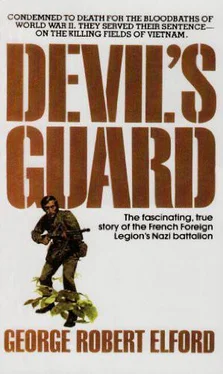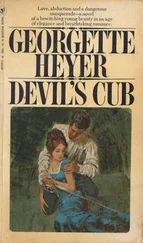“Your village is big?”
“Very big, Nuo. Do you know where Father Ho’s soldiers are now?”
“In the tunnel,” he said matter-of-factly, playing with the tank. “But they will come out soon.”
We exchanged glances and Xuey signaled me to let him do the talking now. He wrinkled the mat in such fashion that the tank could clamber up and down the ridges.
“Why did Father Ho’s soldiers go into the tunnel, Nuo?” Xuey asked quietly. “We are friends.”
“They thought you were Frenchmen. When they see that you are not French, they will come out.”
“Is it a big tunnel?”
“Very big. Many men sleep there.”
Nuo carried a blanket to the cot and let the tank run on it. We helped him to arrange the folds in various patterns of “hills” and “valleys.”
“Do you know where the door of the tunnel is?” Xuey asked the crucial question casually. “Is it here in your house?”
“No,” he shook his head. “One door is under Bo’s house but there are many others too. The soldiers use the door in the well.”
“Which well?”
“The well behind Xuong’s house.”
Ten minutes later we knew everything. The tunnel had several exits but the guerrillas used an opening placed halfway down in a well. There was also an underwater exit into the river for emergency use.
The boy glanced up. “Can I go and show the tank to the boys?”
“Sure—show them, Nou.”
Erich nodded.
Xuey led the child gently toward the door. “Don’t tell anyone that you spoke about the tunnel and Father Ho’s soldiers… Not even to your mother.”
“Why not?”
“Because it is a secret. They will beat you and take your tank away.”
“Then I won’t tell,” he said determinedly.
“Good boy!” I sent a trooper to take Nuo to his mother, who, with the rest of the civilians, had been removed from the village. We could not detect where the underwater exit was, so I lined the riverbank with fifty men at twenty-yard intervals. Then we went to examine the well.
It was about forty feet deep. Our searchlight revealed no opening in its walls, which appeared to be smooth earth, covered with planks here and there. Riedl hauled up the wooden bucket. It was bone dry. “They aren’t using this well to get water, that’s for sure,” he commented.
Pfirstenhammer examined the rope. He cut away the bucket and began to wind the loose end about his waist “Give me a lamp,” he said, “I’m going down.”
“All right, but be careful.”
He flung his legs over the ledge and started to descend. Schulze and I were playing out the rope slowly. Karl suddenly yelled, “Hans!” His voice sounded hollow as it echoed from the well. “It is right here—facing the house… It is covered with a stone slab… Oaaaaah!” We heard his cry of agony; his voice trailed off and his lamp fell, shone for a moment then went out.
“Karl!” I cried. “Are you all right?” There was no answer but his weight on the rope seemed to have increased.
“Let’s get him out of there!” Schulze shouted. Bracing ourselves we hauled on the rope like a pair of madmen. I could hear a strange grating sound as Karl came up.
“Gott im Himmel!” Riedl cried, his face ashen.
We lifted Karl to the ground. Blood was oozing from his breast and he was breathing his last. A four-foot spear with a two-inch-wide blade had been driven into his chest. His eyes were open but he could not speak. Moments later he was dead.
“Sauhunde!” Erich swore. He sprang to the well, his face distorted. Tearing a grenade from his belt he threw it into the well, then staggered away as the blast erupted from down below. He grabbed the spear in Karl’s breast and pulled it free.
“Keep this!” He handed it to Krebitz, who had just arrived panting at Karl’s body. “I will put the blood of a hundred terrorists on this blade,” he cried. “By God, I will!” Taking his kerchief, Riedl wiped the blood from Karl’s face. He was sobbing openly. “We are going, we are all going… Eisner, Schenk, now Karl… we are too few and we are all damned…”
“Shut up, Helmut!” As the news spread, small groups of troopers gathered around us in silence. Sergeant Zeisl and the girls came. Realizing what had happened, Noy uttered a faint cry and collapsed beside Karl. Riedl lifted her and led her away. With his eyes narrowed and his lips set in a savage thin line, Schulze walked back to the well. He flashed his light into the depths, then turned toward me.
“What do you intend to do about it, Hans?”
“We are going to blast them, Erich.”
“Shall I go down to see what we can do?”
“Like hell you will!” I snapped. “We have had enough climbing for today.”
“Now we know what to expect.”
“Not on your life.”
Sergeant Zeisl and the medics laid Karl on an improvised stretcher and covered him with a blanket.
“We will take him into the hills and bury him decently,” I said slowly, then turned to Riedl. “Deploy around every hut, every barn, and every object that might conceal an exit from the tunnel. Open those which the boy spoke of and fill the holes with earth and rubble. No one is to enter any cellar or tunnel. Understood?”
“Understood!”
“Take Noy with you,” I added after a moment. “Take care of her.”
“I will do that, Hans.”
I spoke to Krebitz. “Do you think we can blast the way open from the well?”
“I should first see where to put the charge.”
“That’s out of question. You cannot go down.”
He pursed his lips. “Then it’s going to be difficult, Hans. To blast the entrance we would have to suspend a charge down below, approximately opposite the. opening, then cover up the well to force the blast to work horizontally instead of escaping upward into the open.”
“You may have the whole village to work for you.”
He shook his head. “It is not a question of workmen. The terrorists would cut the rope and drop the charge long before we could cover up the well and prepare for the blasting.”
“What do you suggest then?”
“I can blast a hole down to the tunnel from above.”
“From where?”
“From here—where we are standing. Karl said that the entrance appeared to face the house.”
He walked slowly in the direction of the tunnel, then stopped. “From here!”
“How long will it take?” Schulze queried.
“Who cares?” I said. “We are going to stay right here until we have gotten all those bastards.”
“I should say ninety minutes. It depends on the ground,” Krebitz said.
“Do it then.”
Sergeant Krebitz collected his men and they set to work, digging a shaft. Ten minutes later Krebitz yelled: “Take cover!” An explosion rocked the village; at the well a twisting pillar of smoke spiraled skyward. I went to see the crater. It was about six feet deep and ten feet wide. When the dust settled, the men clambered down to bore another shaft for the subsequent blasting.
With the fourth charge, Krebitz blasted into the tunnel. At the bottom of the now twenty-foot-deep crater we saw a wide jagged hole. Krebitz flung four grenades into the opening, then descended. Keeping clear of the hole, the men of Gruppe Drei set up a flamethrower with its muzzle pointing down into the hole at an angle. Soon a cloud of thick smoke emerged from the crater. Holding on to the ropes, Sergeant Krebitz ascended, coughing and spitting. “Now let’s get out of here just in case the thing is blazing away at an ammo crate,” he yelled.
With hand grenades we demolished every hut that concealed a tunnel exit, then, accompanied by Schulze, I went down to the river. “Now they will either roast alive or swim for it,” Schulze said bitterly.
Читать дальше












